As the global economy continues to evolve, with an increasing emphasis on extractive industries, renewable energy projects, and other infrastructure developments in remote and often inhospitable regions, the need for innovative housing solutions to support the growing workforce has become a pressing concern. Traditional labor camp models, characterized by substandard living conditions and a lack of long-term sustainability, have struggled to keep pace with the demands of modern society, prompting the emergence of more progressive and environmentally responsible alternatives.
Enter the Lida Group, a pioneering company that has disrupted the traditional labor camp industry by introducing a groundbreaking concept: sustainable container labor camps. By repurposing standard shipping containers and transforming them into self-contained, modular living units, the Lida Group has created a housing solution that not only addresses the unique challenges of remote workforce accommodations but also sets a new standard for sustainability, comfort, and overall quality of life.
“The labor camp industry has long been plagued by a reputation for poor living conditions, environmental degradation, and a general disregard for the well-being of the workforce,” explains the CEO of the Lida Group. “We recognized an urgent need to rethink this model and develop a solution that could not only meet the practical demands of remote sites but also promote the health, safety, and overall satisfaction of the people who live in these accommodations.”
At the heart of the Lida Group’s sustainable container labor camps lies a deep commitment to innovation, sustainability, and a user-centric design approach that prioritizes the needs and preferences of the workforce. By leveraging the inherent strengths of shipping containers – their durability, modularity, and portability – the Lida Group has created a highly adaptable and customizable housing solution that can be seamlessly integrated into a wide range of remote and challenging environments.
“Shipping containers are an incredibly versatile and resilient building material, and we recognized their immense potential to revolutionize the way we approach remote workforce accommodations,” the CEO explains. “By repurposing these ubiquitous steel structures and transforming them into high-quality living spaces, we’re able to deliver a level of functionality, sustainability, and occupant comfort that simply can’t be matched by traditional labor camp models.”
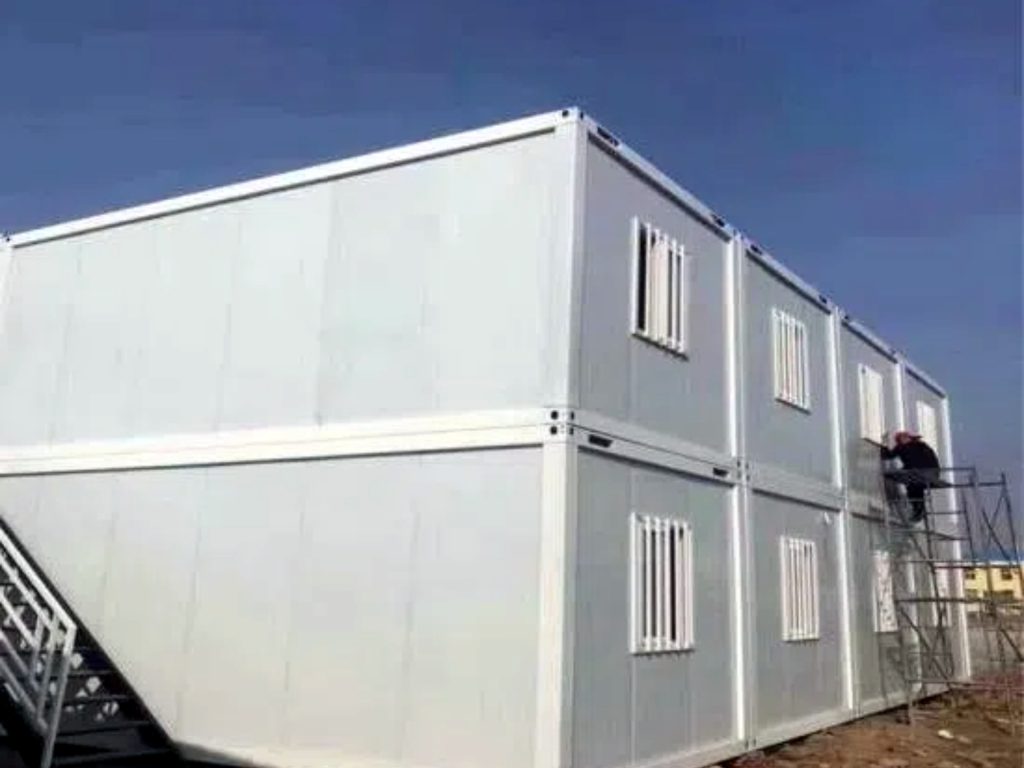
Embracing the Power of Modularity and Adaptability
At the core of the Lida Group’s sustainable container labor camps is a modular design approach that allows for a high degree of customization and adaptability to meet the unique needs of each project and its workforce.
“Every remote worksite presents its own set of challenges, from the local climate and terrain to the specific requirements of the workforce,” the CEO explains. “By designing our container units to be highly modular and reconfigurable, we’re able to create living spaces that can be tailored to the unique needs of our clients and their employees, ensuring a level of functionality and comfort that is unmatched in the industry.”
The Lida Group’s modular container units are engineered using a sophisticated system of interlocking, self-contained modules that can be easily assembled, disassembled, and reconfigured to create a wide range of living configurations. From single-occupancy rooms to larger communal living spaces, the container units can be combined and rearranged to accommodate the specific needs and preferences of the workforce, whether they are working on a remote mining site, a renewable energy project, or any other type of infrastructure development in a challenging environment.
“The ability to quickly and easily adapt our container units to the unique demands of each project site is a critical component of our sustainable labor camp solution,” the CEO explains. “By providing our clients with the flexibility to adjust the layout, size, and overall configuration of the living spaces, we’re able to ensure that the accommodations are perfectly aligned with the needs of their workforce, ultimately contributing to higher levels of satisfaction, productivity, and overall well-being.”
Beyond the modular design, the Lida Group’s sustainable container labor camps also incorporate a range of advanced mobility features that further enhance their adaptability and responsiveness to changing environments. Equipped with state-of-the-art transportation systems, including integrated trailer hitches and custom-engineered chassis, the container units can be easily relocated, transported, and deployed in a wide range of remote and off-grid locations.
“Mobility is a key differentiator for our sustainable container labor camps, as it allows us to quickly and efficiently deploy our living spaces to meet the evolving needs of our clients and their workforce,” the CEO explains. “Whether our clients need to relocate their accommodations to a new project site, expand their living spaces to accommodate a growing workforce, or simply reposition their units to take advantage of changing environmental conditions, our container units can be easily and seamlessly transported to meet these dynamic demands.”
By embracing the power of modularity and mobility, the Lida Group has been able to create a revolutionary housing solution that challenges the traditional notions of what a “labor camp” should be, empowering remote workforce employers to provide their employees with living spaces that are not only highly functional but also adaptable, comfortable, and conducive to their overall well-being.
“The traditional labor camp model has long been associated with substandard living conditions, limited amenities, and a general disregard for the needs of the workforce,” the CEO explains. “Our sustainable container labor camps represent a fundamental shift in this paradigm, offering a level of customization, comfort, and overall quality of life that is simply unmatched in the industry.”
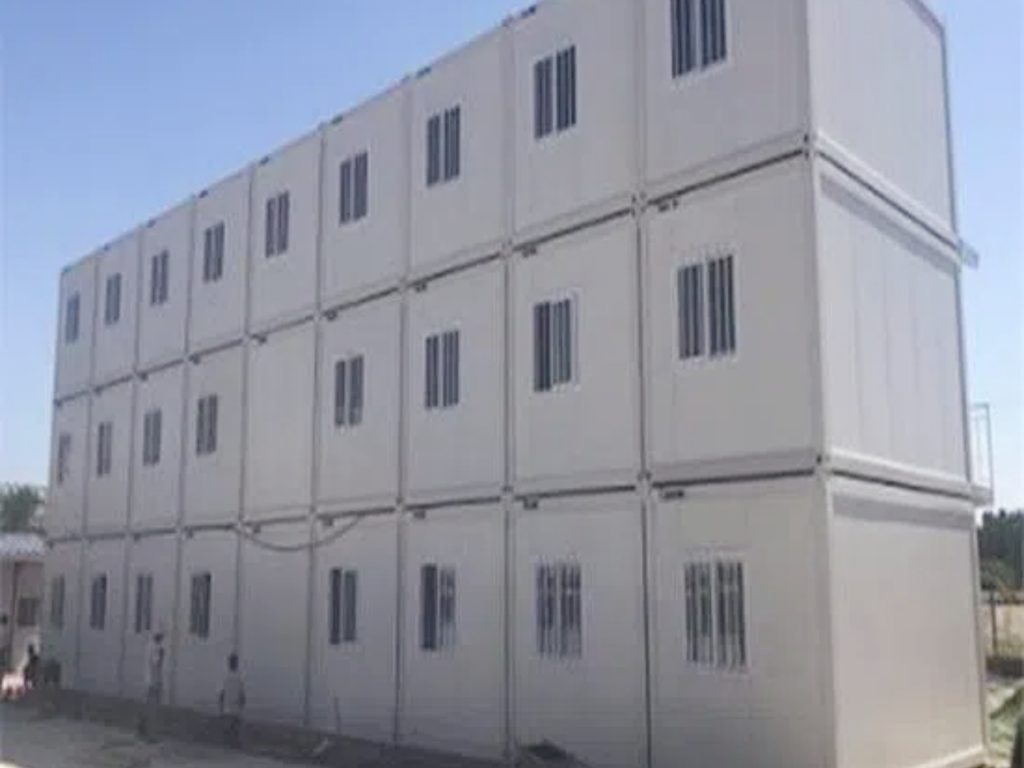
Driving Sustainable and Resilient Design
As the global community grapples with the escalating impacts of climate change, environmental degradation, and the increasing frequency of natural disasters, the Lida Group has made sustainability and resilience two of the core pillars of its sustainable container labor camp solution.
“Sustainable and resilient design is not just a buzzword for us – it’s a fundamental principle that is woven into every aspect of our container labor camp concept,” explains the lead sustainability and resilience expert. “We recognize that the construction and operation of remote workforce accommodations can have a significant environmental impact, and we’re committed to developing solutions that can help mitigate these challenges and contribute to a more sustainable, resilient future.”
At the heart of the Lida Group’s sustainable and resilient design approach lies a carefully curated selection of high-performance, eco-friendly materials and construction techniques. From the use of renewable and recycled resources in the structural components to the integration of advanced insulation systems and energy-efficient appliances, the container units are engineered to minimize their environmental footprint throughout their entire lifecycle.
“Sustainability is not just about reducing energy consumption or minimizing waste – it’s about creating living spaces that can adapt and thrive in the face of an ever-changing world,” the lead sustainability and resilience expert explains. “By leveraging the latest advancements in sustainable materials and construction methods, we’re able to deliver container labor camps that are not only highly efficient and environmentally responsible but also exceptionally durable and resilient.”
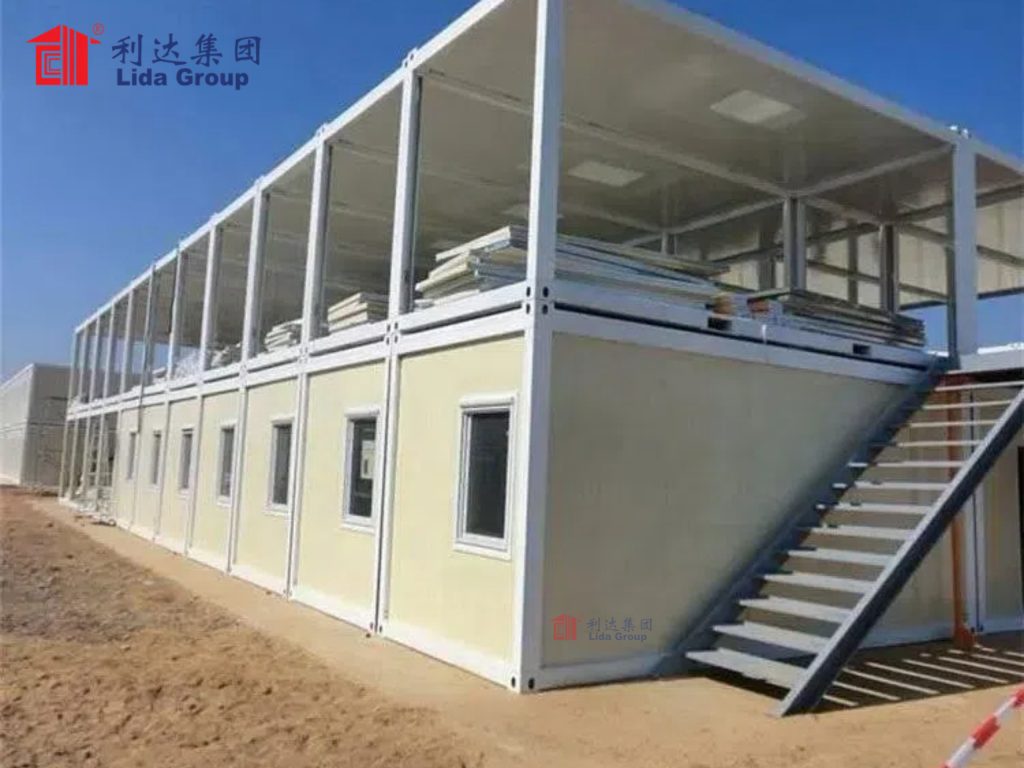
One of the key ways in which the Lida Group has prioritized sustainability and resilience in its sustainable container labor camps is through the integration of advanced renewable energy systems. Each container unit is equipped with a comprehensive suite of solar panels, battery storage, and smart energy management controls, enabling the occupants to generate, store, and optimize their own renewable energy consumption.
“Energy independence and resilience are critical components of our sustainable container labor camp design,” the lead sustainability and resilience expert explains. “By incorporating these cutting-edge renewable energy systems, we’re able to provide our clients and their workforce with a level of self-sufficiency and off-grid capabilities that can be particularly valuable in the face of natural disasters or other disruptions to the traditional energy grid.”
Beyond the integration of renewable energy technologies, the Lida Group’s sustainable container labor camps also feature a range of advanced structural and safety features that enhance their resilience and ability to withstand the impacts of natural disasters and extreme weather events.
“Our container units are engineered to be exceptionally durable and structurally sound, with reinforced frames, impact-resistant cladding, and advanced anchoring systems that can help them withstand the forces of hurricanes, earthquakes, and other natural calamities,” the lead sustainability and resilience expert explains. “Additionally, we’ve incorporated a range of safety features, such as fire suppression systems and emergency backup power, to ensure the well-being and protection of our occupants in the event of a crisis.”
By prioritizing sustainability and resilience throughout the design and engineering of its sustainable container labor camps, the Lida Group is not only minimizing the environmental impact of remote workforce accommodations but also providing its clients and their employees with a level of confidence and security that can be particularly valuable in an increasingly volatile and unpredictable world.
“Our sustainable container labor camps are not just about providing high-quality, functional living spaces – they’re about creating a built environment that can adapt and thrive in the face of the complex challenges we’re currently facing,” the lead sustainability and resilience expert says. “By seamlessly integrating sustainable and resilient design principles into our innovative housing solutions, we’re able to deliver a level of environmental responsibility and disaster preparedness that is truly unmatched in the industry.”
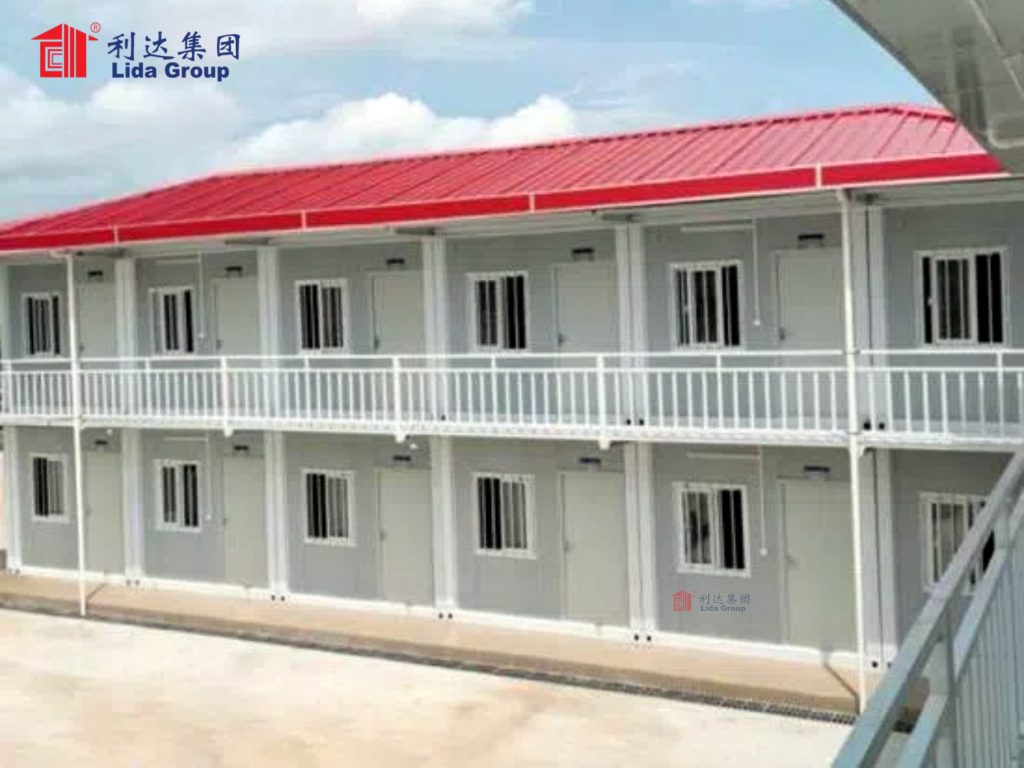
Enhancing Occupant Health, Comfort, and Well-Being
In addition to its unwavering commitment to sustainability and resilience, the Lida Group has also placed a strong emphasis on enhancing the health, comfort, and overall well-being of the occupants of its sustainable container labor camps – a critical consideration in an industry that has long been associated with substandard living conditions and a general disregard for the needs of the workforce.
“The way we design and construct remote workforce accommodations has a profound impact on the physical and mental well-being of the people who use them, and we’ve made it a priority to ensure that our sustainable container labor camps are engineered to promote the overall health and happiness of the workforce,” explains the lead occupant experience expert.
At the core of the Lida Group’s occupant-centric design are a range of innovative features and integrated technologies that are aimed at creating living environments that are not only highly functional but also conducive to the overall comfort and well-being of their inhabitants.
“From the careful selection of non-toxic, low-emission materials to the integration of advanced HVAC systems and smart building controls, every aspect of our sustainable container labor camp design is focused on enhancing the health, safety, and overall quality of life for our occupants,” the lead occupant experience expert explains.
One of the key ways in which the Lida Group prioritizes occupant well-being is through its exceptional thermal performance and indoor air quality. By leveraging advanced insulation technologies, high-efficiency HVAC systems, and sophisticated ventilation strategies, the container units are engineered to maintain a consistent, comfortable temperature and provide a steady supply of fresh, filtered air – critical factors in promoting the overall health and productivity of their occupants.
“Thermal comfort and indoor air quality are essential for our overall well-being, and our sustainable container labor camps are designed to deliver an exceptional level of environmental control and air filtration that simply can’t be matched by many traditional remote workforce accommodation solutions,” the lead occupant experience expert explains. “This not only enhances the comfort and productivity of the people using our container units but also contributes to their long-term respiratory health and overall quality of life.”
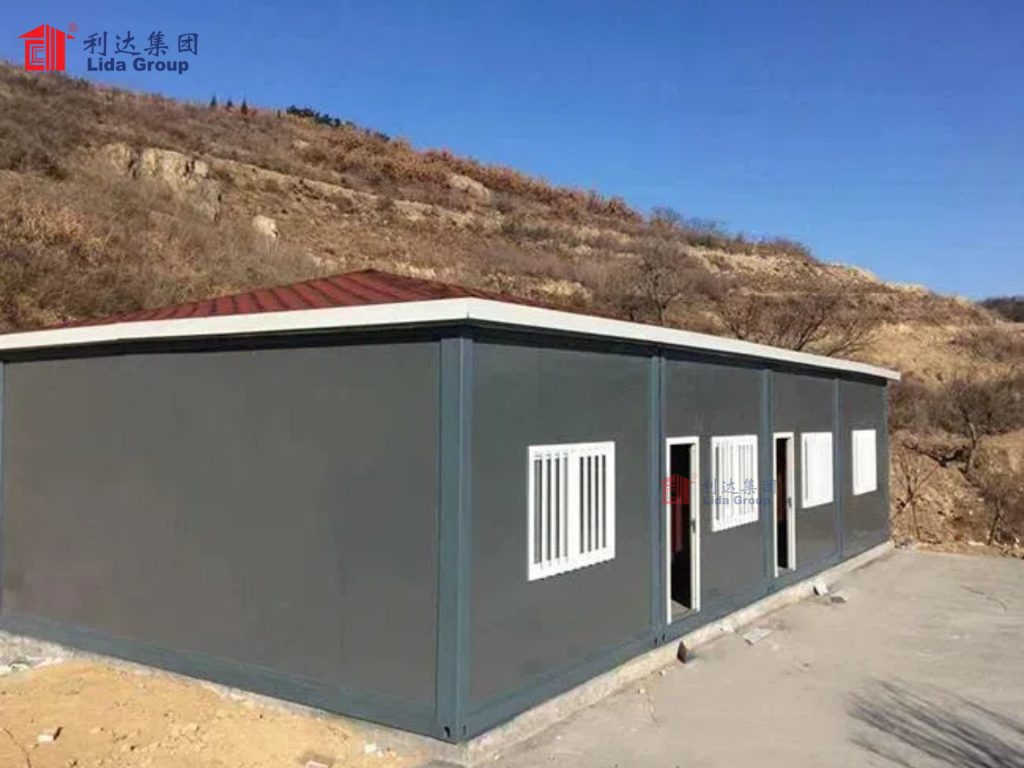
Beyond the physical aspects of the built environment, the Lida Group has also placed a strong emphasis on incorporating design features and smart technologies that can positively impact the mental and emotional well-being of their occupants.
“We recognize that the design of the built environment has a profound impact on our psychological and emotional state, and we’ve made it a priority to incorporate elements into our sustainable container labor camps that can foster a sense of comfort, control, and personal connection for our occupants,” the lead occupant experience expert explains.
This includes the strategic use of natural lighting, thoughtful color and material palettes, and flexible, adaptable layouts that allow occupants to personalize their living spaces according to their unique preferences and needs. Additionally, the container units are equipped with a range of integrated smart technologies, such as circadian lighting systems and biophilic design features, that can help to enhance the overall well-being and productivity of their inhabitants.
“By creating living spaces that are not only highly functional but also aesthetically pleasing and psychologically restorative, we’re able to deliver a level of occupant well-being that can have a tangible impact on the lives of the people who use our sustainable container labor camps,” the lead occupant experience expert says.
The Lida Group’s unwavering commitment to enhancing occupant health, comfort, and well-being extends beyond the physical and psychological attributes of the container units themselves, with the team also investing heavily in the development of advanced digital technologies and integrated smart building systems.
“Our sustainable container labor camps are engineered to be highly intelligent, with a range of integrated sensors, controls, and digital interfaces that allow our occupants to optimize the performance, comfort, and overall management of their living spaces,” the lead occupant experience expert explains. “By providing our clients and their workforce with these cutting-edge building management tools, we’re able to deliver a level of functionality, convenience, and personal control that can have a transformative impact on their day-to-day lives and overall well-being.”
As the remote workforce accommodation industry continues to grapple with the evolving needs and expectations of modern occupants, the Lida Group’s innovative approach to occupant-centric design is poised to play a pivotal role in shaping the future of the built environment.
“By prioritizing the health, comfort, and well-being of the people who use our sustainable container labor camps, we’re not only enhancing the quality of life for our occupants but also contributing to the long-term success and productivity of our clients’ remote operations,” the lead occupant experience expert says. “Our commitment to creating living spaces that are tailored to the unique needs and preferences of modern workers is at the heart of our entire design and engineering process, and it’s a key differentiator that sets our innovative housing solutions apart in the industry.”
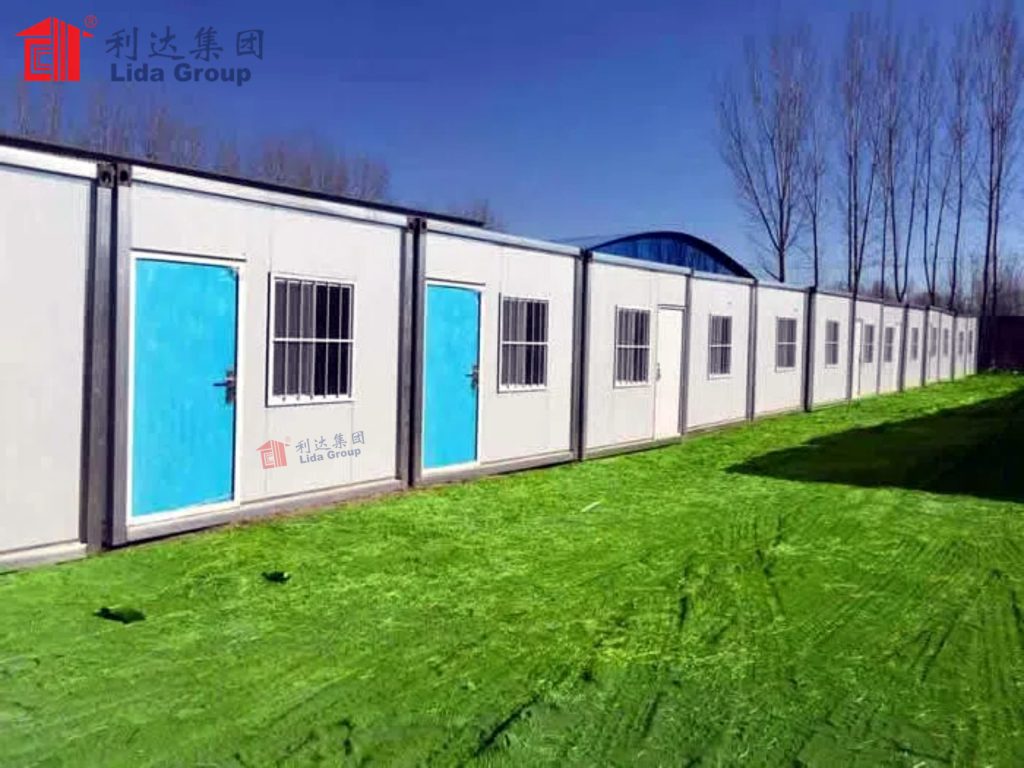
Harnessing the Power of Digital Integration and Automation
Alongside the Lida Group’s innovative design and engineering of its sustainable container labor camps, the team has also placed a strong emphasis on the integration of advanced digital technologies and automation capabilities, further positioning their housing solutions as a driving force in the transformation of the remote workforce accommodation sector.
“The remote workforce accommodation industry has traditionally lagged behind other sectors when it comes to the adoption of digital technologies and automation, but we recognize the immense potential of these emerging tools to drive greater efficiency, precision, and responsiveness across the entire development and delivery lifecycle,” explains the lead digital innovation expert.
At the core of the Lida Group’s digital integration strategy is the team’s proprietary Building Information Modeling (BIM) platform, which serves as a centralized hub for the design, planning, and coordination of their modular container labor camp projects.
“Our BIM platform allows us to seamlessly integrate the various components of the construction process, from the initial design and engineering stages to the manufacturing, delivery, and on-site installation of our container units,” the lead digital innovation expert explains. “By bringing all of these elements together into a single, collaborative digital environment, we’re able to enhance communication, streamline workflows, and ensure the highest levels of quality and precision throughout the entire project lifecycle.”
The Lida Group’s BIM platform is further enhanced by the integration of advanced automation and robotics technologies, which are deployed throughout the team’s state-of-the-art manufacturing facilities to optimize the production and assembly of their container units.
“Automation and robotics play a critical role in our container unit manufacturing process, allowing us to achieve unprecedented levels of speed, accuracy, and consistency in the production of our prefabricated building components,” the lead digital innovation expert explains. “By leveraging these innovative technologies, we’re able to minimize human error, reduce material waste, and deliver a level of quality that simply can’t be matched by traditional, manual construction methods.”
The benefits of the Lida Group’s digital integration and automation capabilities extend beyond the manufacturing process, with the team also incorporating a range of advanced building management systems and smart technologies into the completed container labor camps.
“Our sustainable container labor camps are engineered to be highly intelligent, with integrated sensors, controls, and digital interfaces that allow our clients and their workforce to optimize the performance, energy efficiency, and overall management of their living spaces,” the lead digital innovation expert explains. “By providing them with these cutting-edge building management tools, we’re able to deliver even greater value and long-term operational benefits to our clients and the people who use their container labor camps.”
The integration of these digital and automation technologies not only enhances the efficiency and quality of the Lida Group’s sustainable container labor camp solutions but also provides the team’s clients with a comprehensive suite of data-driven insights and analytics that can inform their decision-making and strategic planning.
“Through the real-time monitoring and analysis of our container unit systems, we’re able to provide our clients with valuable data and insights that can help them to optimize the performance, maintenance, and long-term sustainability of their remote workforce accommodations,” the lead digital innovation expert explains. “This data-driven approach to construction and housing management is a key differentiator for our team, and it’s helping to drive greater transparency, accountability, and overall success for our clients and their workforce.”
By seamlessly integrating cutting-edge digital technologies and automation capabilities into their sustainable container labor camp solutions, the Lida Group is not only enhancing the efficiency and precision of the construction and delivery process but also paving the way for a more technologically advanced, data-driven future in the remote workforce accommodation industry.
“The remote workforce accommodation industry is on the cusp of a digital transformation, and our team is at the forefront of this exciting evolution,” the lead digital innovation expert says. “By leveraging the power of BIM, automation, and smart building technologies, we’re able to provide our clients with a level of innovation, integration, and operational excellence that is redefining the standards of the industry.”
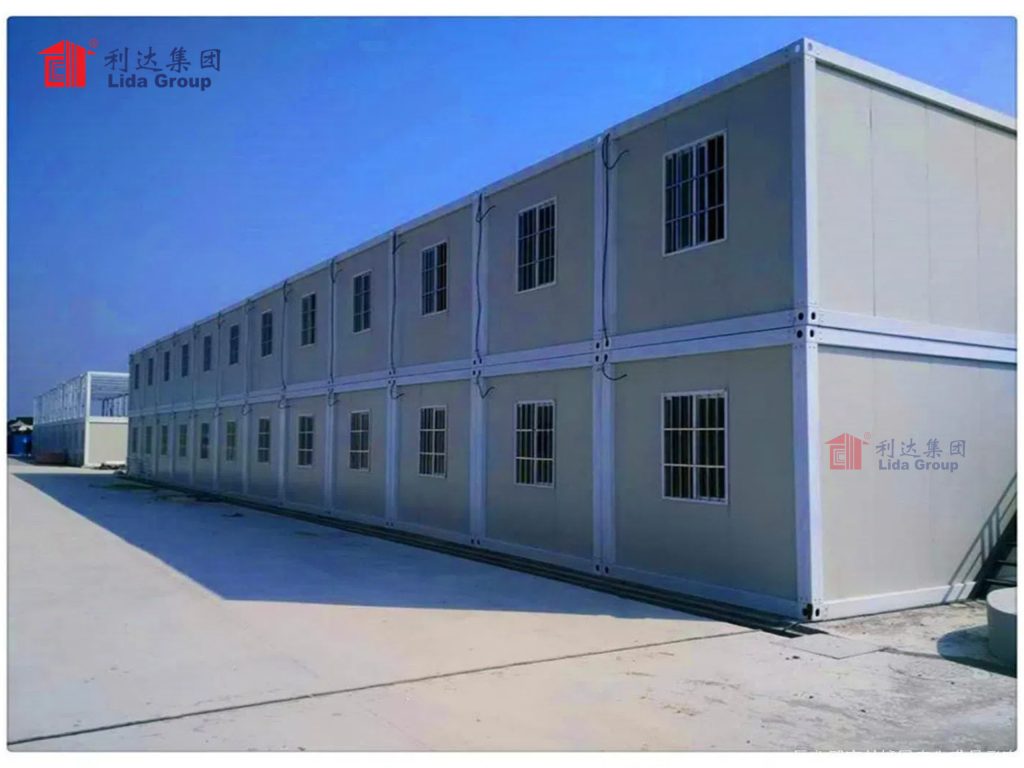
Redefining the Future of Remote Workforce Accommodations
The Lida Group’s introduction of sustainable container labor camps has not only disrupted the traditional remote workforce accommodation industry but also positioned the company as a true pioneer in the construction and housing sectors – a leader that is poised to redefine the future of how we approach the built environment in challenging, remote settings.
“Our approach to sustainable container labor camp design is not just about delivering high-quality, functional living spaces – it’s about fundamentally transforming the way we conceive, design, and construct the environments that shape the lives of remote workers,” the CEO explains. “By placing a strong emphasis on innovation, sustainability, occupant well-being, and digital integration, we’re creating housing solutions that not only meet the practical demands of remote sites but also promote the overall health, happiness, and productivity of the people who use them.”
One of the key ways in which the Lida Group’s sustainable container labor camps are redefining the future of remote workforce accommodations is through their unparalleled level of customization and adaptability. By leveraging the inherent modular and mobile design of their container units, the team is able to create living spaces that can be tailored to the unique needs and preferences of their clients and their workforce, ensuring a level of functionality and comfort that is simply unmatched in the industry.
“The ability to quickly and easily reconfigure our container units to meet the evolving requirements of our clients and their workforce is a game-changer in the remote workforce accommodation sector,” the CEO explains. “Whether our clients need to expand their living spaces to accommodate a growing workforce, relocate their accommodations to a new project site, or adjust the layout and amenities to better suit the needs of their employees, our sustainable container labor camps provide an unrivaled level of flexibility and responsiveness that is simply not found in traditional housing solutions.”
In addition to their exceptional customization and adaptability, the Lida Group’s sustainable container labor camps are also redefining the future of remote workforce accommodations through their unwavering commitment to sustainability and resilience. By integrating advanced renewable energy systems, high-performance insulation, and a range of other cutting-edge sustainable design features, the team is not only minimizing the environmental impact of their housing solutions but also ensuring that they can withstand the impacts of natural disasters and other extreme events.
“Sustainability and resilience are not just buzzwords for us – they’re core principles that are woven into every aspect of our sustainable container labor camp design,” the CEO explains. “By leveraging the latest advancements in sustainable materials, renewable energy technologies, and disaster-resistant engineering, we’re creating living spaces that not only reduce the carbon footprint of remote workforce accommodations but also provide a level of safety, security, and self-sufficiency that is crucial in today’s rapidly changing world.”
Perhaps most significantly, the Lida Group’s sustainable container labor camps are redefining the future of remote workforce accommodations by placing a strong emphasis on the health, comfort, and overall well-being of their occupants. Through the incorporation of advanced indoor air quality systems, biophilic design features, and a range of other occupant-centric design elements, the team is delivering living spaces that not only meet the practical needs of remote workers but also contribute to their long-term physical, mental, and emotional well-being.
“The traditional labor camp model has long been associated with substandard living conditions and a general disregard for the needs of the workforce, but our sustainable container labor camps represent a fundamental shift in this paradigm,” the CEO explains. “By prioritizing the health, comfort, and overall quality of life for our occupants, we’re not only enhancing the day-to-day experiences of remote workers but also contributing to their long-term success, productivity, and overall job satisfaction.”
As the global economy continues to evolve, with an increasing emphasis on the development of infrastructure, energy, and resource extraction projects in remote and often inhospitable regions, the demand for innovative, sustainable, and occupant-centric remote workforce accommodations is only expected to grow. And with its cutting-edge sustainable container labor camp solutions, the Lida Group is poised to lead the charge in redefining the future of this critical industry.
“Our sustainable container labor camps are not just about delivering high-quality housing – they’re about creating living environments that can truly transform the lives of remote workers and the communities they serve,” the CEO explains. “By prioritizing innovation, sustainability, occupant well-being, and digital integration, we’re not only meeting the practical demands of our clients but also setting a new standard for what remote workforce accommodations can and should be in the 21st century.”
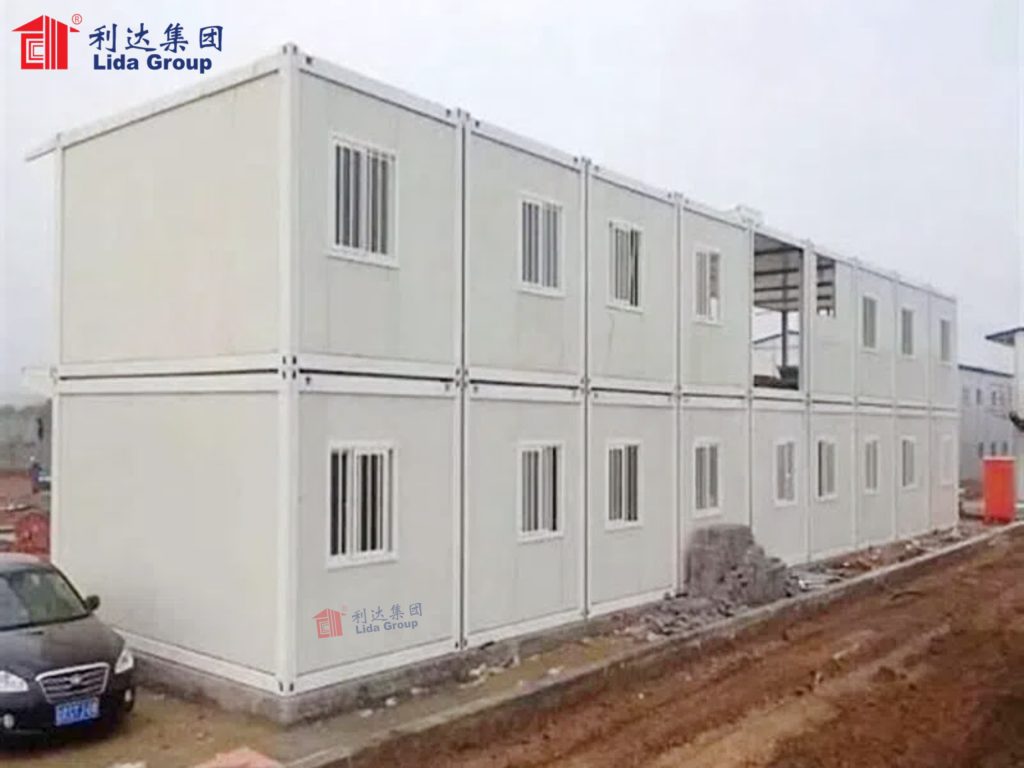
Conclusion
The Lida Group’s introduction of sustainable container labor camps represents a groundbreaking shift in the remote workforce accommodation industry, positioning the company as a true pioneer in the construction and housing sectors. By leveraging the inherent strengths of shipping containers, the team has created a highly customizable, adaptable, and sustainable housing solution that not only meets the practical demands of remote project sites but also prioritizes the health, comfort, and overall well-being of the people who use them.
Through its unwavering commitment to innovation, sustainability, occupant-centric design, and cutting-edge digital integration, the Lida Group is redefining the future of remote workforce accommodations, delivering living spaces that are not only highly functional but also environmentally responsible, resilient, and conducive to the long-term success and productivity of their occupants.
As the global economy continues to evolve, with an increasing emphasis on the development of infrastructure, energy, and resource extraction projects in remote and often inhospitable regions, the demand for innovative, sustainable, and occupant-centric remote workforce accommodations is only expected to grow. And with its groundbreaking sustainable container labor camp solutions, the Lida Group is poised to lead the charge in this critical industry, setting a new standard for what remote workforce accommodations can and should be in the 21st century.

Related news
-
Sandwich Panel Accommodation from Lida Group Provides Durable and Customizable Living Spaces
2024-11-20 17:53:22
-
Transforming the Future of Metal Warehousing: Lida Group’s Innovation in Steel Structural Building Technology
2024-11-20 10:54:09
-
Research stations install modular prefabricated accommodation furnished with removable insulated wall panel bunkrooms from Lida Group's specialized solutions.
2024-10-31 11:23:26
contact us
- Tel: +86-532-88966982
- Whatsapp: +86-13793209022
- E-mail: sales@lidajituan.com


